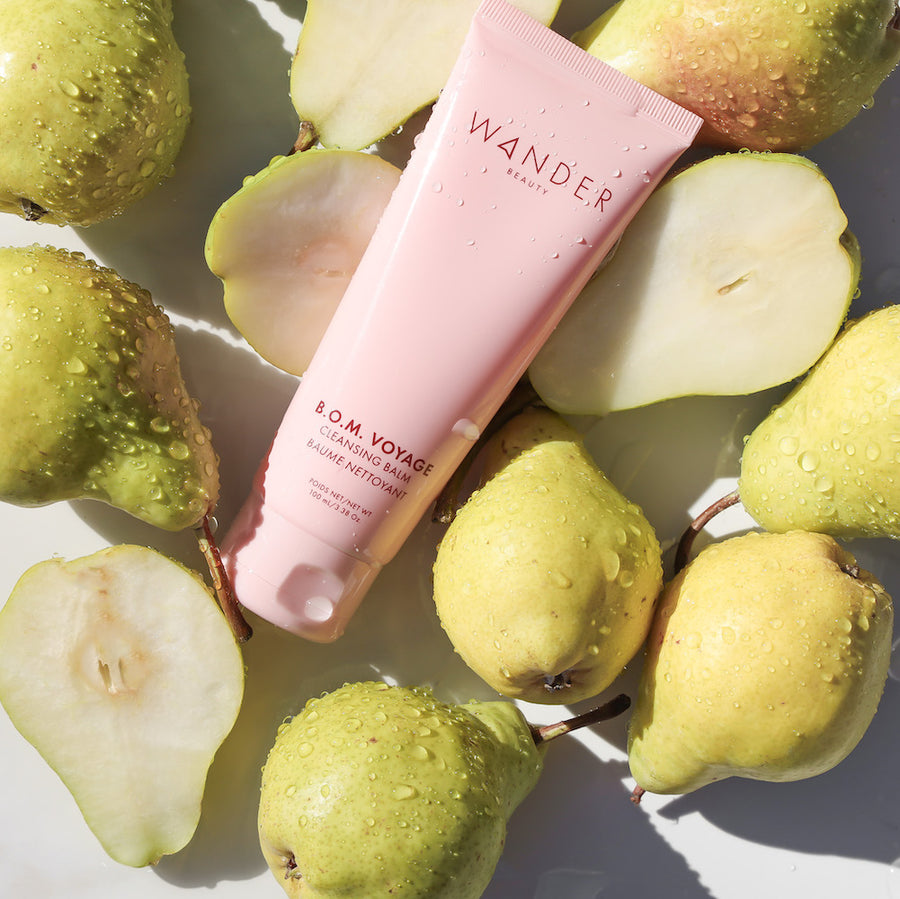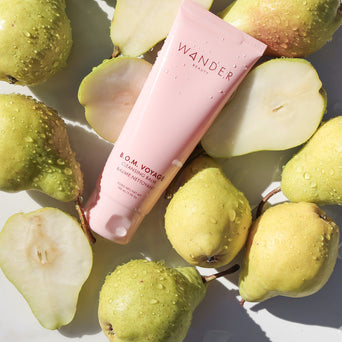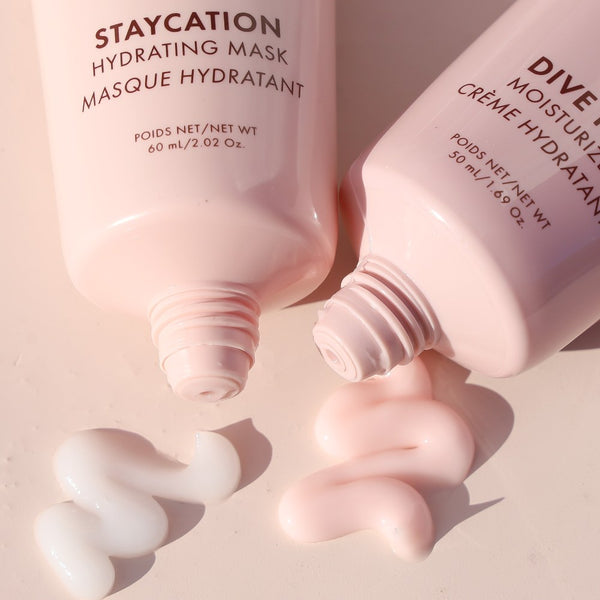The Best Foods for Beautiful Skin
By Wander Beauty | Aug 26, 2022
Beauty and skincare products packed with vitamins and antioxidants such as those found at Wander Beauty can help balance your complexion and give you a natural glow. But if your diet is unhealthy or lacking in essential nutrients, your skin will show. It's important to take care of your skin both externally and internally, making it essential to consume foods that are good for your skin and limit overly processed foods, refined sugars, and other unhealthy foods.
We’re exploring what foods to consume for healthy skin, the best foods for skin repair, and more. Take a look.
How the foods we eat affect our skin
Dry skin, inflammation, and skin conditions may reveal nutritional imbalances in the body, and can therefore be greatly improved by consuming a healthy diet. When it comes to the link between food and skin health, it's not only about eating foods good for the skin but also avoiding foods that may trigger unwanted skin issues. Someone with a gluten or dairy intolerance, for instance, is likely to experience breakouts and rashes as symptoms when they consume these foods, making awareness an important factor when trying to improve your skin with your diet.
Antioxidants
Antioxidants are naturally occurring vitamins and minerals commonly found in fruits and vegetables. They protect the skin by reducing free radical production. Free radicals cause damage to healthy skin cells, break down the skin’s collagen, and create oxidative stress, resulting in blemishes, fine lines, and sagging skin. Antioxidant-rich foods help reduce visible signs of aging, minimize the effects of breakouts and make the skin glow.
Foods high in antioxidants
Berries are touted as a superfood for your skin, and can be added to your morning porridge or smoothie, enjoyed as a snack during the day, or paired with Greek yogurt and honey for a healthy dessert. One cup of wild blueberries contains 13,427 antioxidants – 10 times the USDA’s recommendation! Enjoy the benefits of this delicious fruit both on your plate and on your skin with our Berry Necessary Mini Skincare Kit. A travel-size skincare kit that revitalizes dull skin and keeps your skin hydrated and radiant with the help of raspberry seed oil.
Other foods rich in antioxidants include:
- Green tea
- Olive oil
- Artichokes
- Tomatoes
- Dark chocolate
Vitamin A and C
Both vitamin A and vitamin C are essential nutrients for skin health. Vitamin A supports collagen and keratin production, for firm, strong skin. Vitamin C also supports collagen production and helps reduce redness and inflammation.
Foods high in vitamin A
Liver and other organ meats contain preformed vitamin A, which is easily absorbed and utilized. Though this is an acquired taste, patés are a great way to consume this nutrient-rich delicacy.
Other foods rich in vitamin A include:
- Spinach and kale
- Carrots
- Sweet potatoes (especially the orange variety)
- Pumpkin
- Papaya
Foods high in vitamin C
Oranges and other citrus fruits are well known for being incredible sources of vitamin C. Just one glass of freshly pressed orange juice with your breakfast will give you nearly double the RDI (recommended daily intake).
Other foods rich in vitamin C include:
- Guavas
- Kiwis
- Red bell peppers
- Strawberries
- Broccoli and other cruciferous vegetables
Collagen
Speaking of collagen, this buzzword has taken the beauty and health industry by storm, and for good reason. This protein is found in connective tissue, skin, tendon, bone, and cartilage, and tends to weaken with age and UV exposure, leading to wrinkles, sagging skin, and increased cellulite.
Foods high in collagen
Bone broth is both rich in collagen and helps increase the body's own production of collagen, making it a wonderful food to help maintain skin elasticity and reduce the appearance of fine lines and wrinkles.
Other foods rich in collagen include:
- Eggs
- King mackerel
- Bluefin tuna
- Goat’s cheese
- Green vegetables such as kale and broccoli, and algae such as spirulina have been found to help increase collagen production, though they do not contain collagen.
Essential fatty acids
EFAs help keep the skin healthy and strong by creating a barrier that keeps out harmful microbes and bacteria. It is a common deficiency in the West and can be used as part of a holistic treatment for skin redness, dermatitis, and acne flare-ups. Wander Beauty’s Fast Lane Instant Facial exfoliating mask is one of the best peel-off masks on the market. It is suitable for all skin types and reveals a brighter, more youthful appearance instantly. This skincare face mask contains meadowfoam seed oil – a long-chain fatty acid structure that locks in moisture and delivers nutrients to the skin, along with other nourishing plant-derived ingredients.
Foods high in essential fatty acids
Salmon is one of the best sources of omega-3 fatty acids and DHA. It is known to give you glowing skin and contains anti-inflammatory properties to help reduce redness and irritation. Omega-3s keep skin thick, supple, and moisturized.
Other foods rich in essential fatty acids include:
- Oily fish
- Flaxseed oil
- Chia seeds
- Walnuts and other nuts
- Avocados
Zinc
The benefits and importance of zinc cannot be understated. It plays a critical role in protein synthesis and skin healing, sebum regulation, and enzymatic activity (helping the skin shed old skin cells), and its anti-inflammatory properties help those with acne, rosacea, eczema, and psoriasis. It is recommended to supplement zinc due to the nutrient-depleted soil in which our foods are grown.
Foods high in zinc
Oysters and other shellfish are excellent sources of zinc and are said to be an anti-aging food. Just three oysters will meet your daily zinc requirements. They are also rich in vitamin D, copper, and manganese – all of which keep your skin looking youthful and healthy.
Other foods rich in zinc include:
- Tofu
- Pumpkin seeds and nuts
- Lentils
- Oatmeal
Probiotics
Not only are probiotics good for your gut, but they're also good for your skin, too! Probiotics have been found to be helpful in the prevention and treatment of skin disorders such as atopic dermatitis, acne, eczema, allergic skin inflammation, skin hypersensitivity, UV-induced skin damage, and wound healing. They can also restore the pH balance of the skin and reduce the effects of photo-aging.
Foods high in probiotics
Cultured yogurt (both dairy and non-dairy versions) is a delicious way to get your daily serving of probiotics. Because not all yogurt contains probiotics, it's important to search for one that has live active cultures such as Greek yogurt. Research has shown that cultured yogurt may also improve skin elasticity, prevent dryness, and diminish the appearance of pores.
Other probiotic foods include:
- Kimchi
- Sauerkraut
- Kombucha
- Kefir
- Miso
Water
There's a reason you keep hearing about the importance of adequate water intake, not only for your general health but for the health of your skin, and that's because it's simply that important! Proper hydration helps maintain your skin's elasticity and glow. It helps flush the body of toxins and can reduce puffiness. Research has shown that people who keep well hydrated are less likely to scar, and may not show as many signs of aging as those who are dehydrated.
Foods high in water
It is suggested that you consume six to eight glasses of water every day, depending on your weight and activity level. It is also helpful to consume water-rich foods, which include:
- Coconut water
- Watermelon
- Grapes
- Cucumbers
- Tomatoes
A nutrient-rich diet paired with clean, organic skincare products and a good skincare routine is a fail-proof plan for beautiful skin. You stock up on the berries and we’ll take care of the cosmetics! Explore The Wanderess Edit for more expert beauty and skincare tips.
The Best Foods for Beautiful Skin

Beauty and skincare products packed with vitamins and antioxidants such as those found at Wander Beauty can help balance your complexion and give you a natural glow. But if your diet is unhealthy or lacking in essential nutrients, your skin will show. It's important to take care of your skin both externally and internally, making it essential to consume foods that are good for your skin and limit overly processed foods, refined sugars, and other unhealthy foods.
We’re exploring what foods to consume for healthy skin, the best foods for skin repair, and more. Take a look.
How the foods we eat affect our skin
Dry skin, inflammation, and skin conditions may reveal nutritional imbalances in the body, and can therefore be greatly improved by consuming a healthy diet. When it comes to the link between food and skin health, it's not only about eating foods good for the skin but also avoiding foods that may trigger unwanted skin issues. Someone with a gluten or dairy intolerance, for instance, is likely to experience breakouts and rashes as symptoms when they consume these foods, making awareness an important factor when trying to improve your skin with your diet.
Antioxidants
Antioxidants are naturally occurring vitamins and minerals commonly found in fruits and vegetables. They protect the skin by reducing free radical production. Free radicals cause damage to healthy skin cells, break down the skin’s collagen, and create oxidative stress, resulting in blemishes, fine lines, and sagging skin. Antioxidant-rich foods help reduce visible signs of aging, minimize the effects of breakouts and make the skin glow.
Foods high in antioxidants
Berries are touted as a superfood for your skin, and can be added to your morning porridge or smoothie, enjoyed as a snack during the day, or paired with Greek yogurt and honey for a healthy dessert. One cup of wild blueberries contains 13,427 antioxidants – 10 times the USDA’s recommendation! Enjoy the benefits of this delicious fruit both on your plate and on your skin with our Berry Necessary Mini Skincare Kit. A travel-size skincare kit that revitalizes dull skin and keeps your skin hydrated and radiant with the help of raspberry seed oil.
Other foods rich in antioxidants include:
- Green tea
- Olive oil
- Artichokes
- Tomatoes
- Dark chocolate
Vitamin A and C
Both vitamin A and vitamin C are essential nutrients for skin health. Vitamin A supports collagen and keratin production, for firm, strong skin. Vitamin C also supports collagen production and helps reduce redness and inflammation.
Foods high in vitamin A
Liver and other organ meats contain preformed vitamin A, which is easily absorbed and utilized. Though this is an acquired taste, patés are a great way to consume this nutrient-rich delicacy.
Other foods rich in vitamin A include:
- Spinach and kale
- Carrots
- Sweet potatoes (especially the orange variety)
- Pumpkin
- Papaya
Foods high in vitamin C
Oranges and other citrus fruits are well known for being incredible sources of vitamin C. Just one glass of freshly pressed orange juice with your breakfast will give you nearly double the RDI (recommended daily intake).
Other foods rich in vitamin C include:
- Guavas
- Kiwis
- Red bell peppers
- Strawberries
- Broccoli and other cruciferous vegetables
Collagen
Speaking of collagen, this buzzword has taken the beauty and health industry by storm, and for good reason. This protein is found in connective tissue, skin, tendon, bone, and cartilage, and tends to weaken with age and UV exposure, leading to wrinkles, sagging skin, and increased cellulite.
Foods high in collagen
Bone broth is both rich in collagen and helps increase the body's own production of collagen, making it a wonderful food to help maintain skin elasticity and reduce the appearance of fine lines and wrinkles.
Other foods rich in collagen include:
- Eggs
- King mackerel
- Bluefin tuna
- Goat’s cheese
- Green vegetables such as kale and broccoli, and algae such as spirulina have been found to help increase collagen production, though they do not contain collagen.
Essential fatty acids
EFAs help keep the skin healthy and strong by creating a barrier that keeps out harmful microbes and bacteria. It is a common deficiency in the West and can be used as part of a holistic treatment for skin redness, dermatitis, and acne flare-ups. Wander Beauty’s Fast Lane Instant Facial exfoliating mask is one of the best peel-off masks on the market. It is suitable for all skin types and reveals a brighter, more youthful appearance instantly. This skincare face mask contains meadowfoam seed oil – a long-chain fatty acid structure that locks in moisture and delivers nutrients to the skin, along with other nourishing plant-derived ingredients.
Foods high in essential fatty acids
Salmon is one of the best sources of omega-3 fatty acids and DHA. It is known to give you glowing skin and contains anti-inflammatory properties to help reduce redness and irritation. Omega-3s keep skin thick, supple, and moisturized.
Other foods rich in essential fatty acids include:
- Oily fish
- Flaxseed oil
- Chia seeds
- Walnuts and other nuts
- Avocados
Zinc
The benefits and importance of zinc cannot be understated. It plays a critical role in protein synthesis and skin healing, sebum regulation, and enzymatic activity (helping the skin shed old skin cells), and its anti-inflammatory properties help those with acne, rosacea, eczema, and psoriasis. It is recommended to supplement zinc due to the nutrient-depleted soil in which our foods are grown.
Foods high in zinc
Oysters and other shellfish are excellent sources of zinc and are said to be an anti-aging food. Just three oysters will meet your daily zinc requirements. They are also rich in vitamin D, copper, and manganese – all of which keep your skin looking youthful and healthy.
Other foods rich in zinc include:
- Tofu
- Pumpkin seeds and nuts
- Lentils
- Oatmeal
Probiotics
Not only are probiotics good for your gut, but they're also good for your skin, too! Probiotics have been found to be helpful in the prevention and treatment of skin disorders such as atopic dermatitis, acne, eczema, allergic skin inflammation, skin hypersensitivity, UV-induced skin damage, and wound healing. They can also restore the pH balance of the skin and reduce the effects of photo-aging.
Foods high in probiotics
Cultured yogurt (both dairy and non-dairy versions) is a delicious way to get your daily serving of probiotics. Because not all yogurt contains probiotics, it's important to search for one that has live active cultures such as Greek yogurt. Research has shown that cultured yogurt may also improve skin elasticity, prevent dryness, and diminish the appearance of pores.
Other probiotic foods include:
- Kimchi
- Sauerkraut
- Kombucha
- Kefir
- Miso
Water
There's a reason you keep hearing about the importance of adequate water intake, not only for your general health but for the health of your skin, and that's because it's simply that important! Proper hydration helps maintain your skin's elasticity and glow. It helps flush the body of toxins and can reduce puffiness. Research has shown that people who keep well hydrated are less likely to scar, and may not show as many signs of aging as those who are dehydrated.
Foods high in water
It is suggested that you consume six to eight glasses of water every day, depending on your weight and activity level. It is also helpful to consume water-rich foods, which include:
- Coconut water
- Watermelon
- Grapes
- Cucumbers
- Tomatoes
A nutrient-rich diet paired with clean, organic skincare products and a good skincare routine is a fail-proof plan for beautiful skin. You stock up on the berries and we’ll take care of the cosmetics! Explore The Wanderess Edit for more expert beauty and skincare tips.



